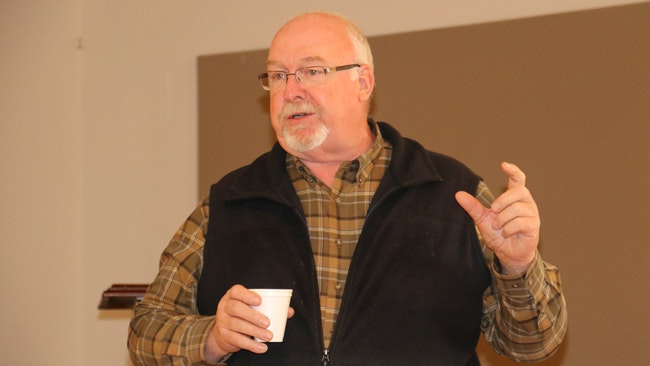
State Sen. Lynn Findley, R-Vale, says he focuses on good ideas and people who will work with him in a session where Democrats have the numbers to dominate. (Enterprise file photo)
Two weeks into Oregon’s legislative session, Democrats are moving forward with plans to pay overtime to farmworkers, create job training programs targeted at people of color and protect school officials from being fired for following government mandates.
If Republicans instead controlled the Legislature, the past two weeks would instead have been dominated by talk of tax cuts, clipping Gov. Kate Brown’s power and giving parents more control over which school their children attend and what they learn.
Republicans have made the case that they represent large swaths of Oregon, and the inability to advance some legislation means people in those areas can be left out of legislative action. They remain a minority in the Legislature — and in voter registrations. Despite that, Republicans each session introduce legislation representing often rural and more conservative interests.
They hold 23 seats in the 60-person House and 11 in the 30-person Senate. They chair no committees but do serve as vice chairs of most.
“I think you’d see school choice options,” said Sen. Tim Knopp, R-Bend and leader of the Senate GOP caucus. “I think you’d see our interest in making sure that schools stay open. I think you would see support for law enforcement as opposed to the soft-on-crime agenda that Governor Brown and the Democrats are pursuing.”
Most proposals that make it out of the Legislature are bipartisan, noncontroversial and relatively boring. So far this year, the House and Senate have voted to confirm that the state follows the same definition of “taxable income” as the federal government and extend a deadline for a report on the effect local government fees have on housing costs.
Shorter legislative sessions in even-numbered years also mean less debates over policy, because legislators have just 35 days in Salem. Many proposals that legislators and lobbyists spent months or years working died Monday because they hadn’t been advancing at a pace to meet legislative deadlines.
That includes nearly all of the nine bills Senate Republicans listed as their top legislative priorities, though Knopp said he isn’t worried. Republicans can still have their concerns addressed in the budget process, which isn’t subject to Monday’s deadline.
“Most of our agenda is the budget items that are important to our constituents and our communities,” Knopp said. “And so whether that’s law enforcement dollars or that’s dollars to thin [forests], that can all be done through the ways and means process, so, we’re not concerned at this point.”
And, he added, there are still ways to bring other proposals to the full Senate. Republicans can use procedural moves to force senators to vote on bringing their legislation up for debate. It rarely works, but it can bring attention to a proposal and create a campaign talking point.
Senate Republicans are seeking $60 million for Oregon State Police to investigate illegal marijuana farms and $50 million to pay for forest thinning. Knopp said he’s hopeful after Republicans succeeded in securing millions for drought relief and marijauna enforcement during a one-day special session in December, but he expects negotiations over the $1.5 billion the Legislature has to spend to continue for another two weeks.
If all else fails, he said, Republicans still have recourse: They can walk out, as they have at various points in each of the past three years, and bring the legislative session to a temporary or permanent halt.
“I’ve been very clear with the Democrat majority that our goal is to make sure that all Oregon voices are heard, and respected and included,” he said. “And if they’re not, I feel no constitutional obligations to stand around and allow Democrats to pass their liberal progressive agenda that our constituents don’t want.”
House Republican leader Vikki Breese-Iverson, R-Prineville, has said her caucus will focus on budgetary issues and fixing existing laws, but has remained vague on what legislation party representatives hope to pass. She did not answer multiple calls or emails from the Capital Chronicle.
House GOP spokesman Andrew Fromm referred to a brief statement Breese-Iverson issued on Feb. 1, in which she wrote that her caucus would focus on “restoring education standards, holding state government accountable and enabling our law enforcement to do its job.
“We will push to remove roadblocks to health care access and preserve Oregon’s natural environment while protecting the way of life of communities relying on these resources,” it continued. “We will give Oregonians the freedom to recover financially from government-mandated shutdowns by fighting the state’s regulatory burdens and mandates.”
Her office didn’t answer whether legislation was introduced to accomplish those goals.
So far, House Republicans have maintained a united front against a plan to require farms to pay employees time-and-a-half after more than 40 hours of work in a week. Each day, at least one House Republican has spoken on the floor of the House about their belief that House Bill 4002 would create too great a financial burden on farmers and drive some out of business.
House Republicans have also insisted on reading many pieces of legislation aloud in their entirety, creating lengthy delays as a computer reads to a mostly empty chamber. Then-House Speaker Tina Kotek began using the robotic reading system over concerns about Covid exposure in 2021.
Rep. Mark Owens, R-Crane, is a farmer and represents a heavily agricultural area that includes Baker, Grant, Harney and Malheur counties. Along with opposing the agricultural overtime proposal, he’s pushing a $1 million increase for a state fund that reimburses farmers and ranchers for livestock lost to wolves. His House Bill 4127 received a public hearing, and the money could be added to the state budget.
Owens, who also serves on the Crane School Board, said he’s scrutinizing education measures, including one that would direct the state Education Department to mandate and provide training for new school board members. He said school board members need to understand public meetings laws and their responsibilities, but the state shouldn’t prescribe specific training.
“The bill as written is not palatable for myself or for my communities,” Owens said. “Once again, it looks like a top down approach, in order to mandate what type of educational requirements are needed. I support school boards getting mandatory training, but allow them to have a choice in how that training is going to occur.”
Rep. Lily Morgan, R-Grants Pass, said she is focused on ramping up enforcement on illegal cannabis operations, which are disproportionately affecting her part of the state in southern Oregon. That includes the increased funding for Oregon State Police spearheaded by Knopp, as well as a proposal to take on water theft occurring in illegal cannabis operations that is expected to move forward Monday.
She also supports a bipartisan measure that advanced Monday to require employees of the Oregon Liquor and Cannabis Commission to report suspected human trafficking on marijuana farms.
“There’s outright slavery and forced labor and human trafficking going on related to these drug trafficking organizations in Southern Oregon,” Morgan said.
Another of Morgan’s proposals, which is moving forward, would adjust the use of marijuana revenue to increase the share going to police and schools. Morgan said the money has been vital to funding behavioral health specialists and school resource officers in her district.
Rep. Raquel Moore-Green, R-Salem, said requiring school districts to post their curricula online was one of her top priorities this session. Proposals in the House and Senate to accomplish that floundered without debate.
She joined several other Republicans, and a few Democrats, in supporting proposals to exempt pharmacies from paying a new corporate activity tax that funds state education programs. Critics describe the tax as a hidden sales tax that most businesses pass on to consumers, but pharmacies don’t control drug prices and can’t charge consumers more for prescription drugs.
Because of that, Moore-Green said, the retail chain Bi-Mart closed its in-store pharmacies and several small rural pharmacies shut down.
Sen. Lynn Findley, R-Vale, initially proposed a broader exemption that would also apply to diapers, baby formula and feminine hygiene products. He narrowed the focus to only prescription drugs after learning that it would take a lot of work to identify every eligible item, but he said he hopes to return in 2023 with more exemptions for personal care products.
“I’d like to have all of it, but in a short session, there’s not time,” he said.
Findley said Democrats in the House and the Senate were skeptical of the impact his proposal could have on funding for education, but he remains hopeful that they’ll adopt his proposal. Tax measures aren’t subject to the same deadline as other bills, and Findley’s was among the few Republican bills that received a hearing.
It’s harder to pass legislation from the minority party, he said, but he’s managed to do so each year. Findley said he doesn’t waste time thinking about what he would do if Republicans controlled the Legislature, but instead looks for good ideas and people who will work with him.
“It’s a waste of time to just sit around and daydream,” he said. “I don’t do that. If there’s a good piece of legislation, I’m gonna make a hard effort to try to pass it, and sometimes you make it and sometimes, you don’t.”
Oregon Capital Chronicle is part of States Newsroom, a network of news bureaus supported by grants and a coalition of donors as a 501c(3) public charity. Oregon Capital Chronicle maintains editorial independence. Contact Editor Les Zaitz for questions: [email protected]. Follow Oregon Capital Chronicle on Facebook and Twitter.




